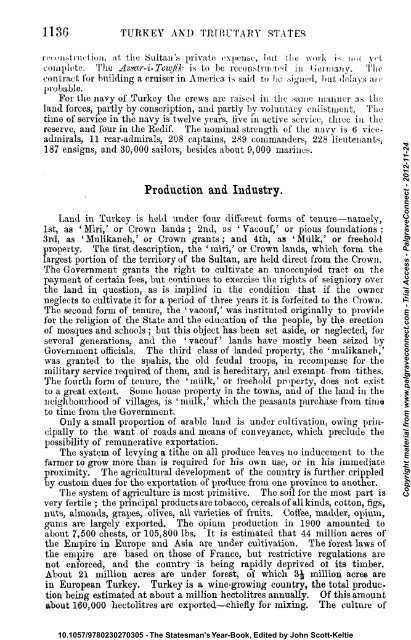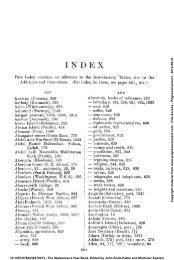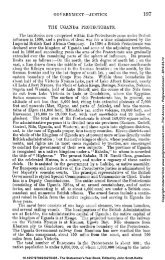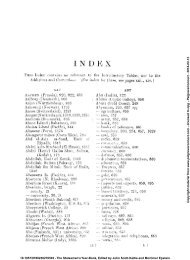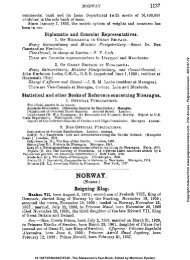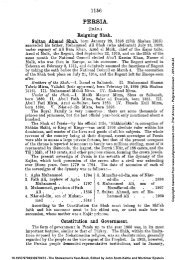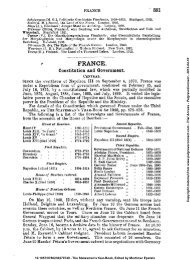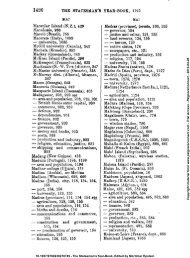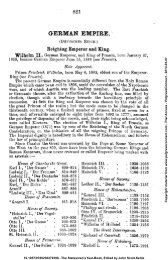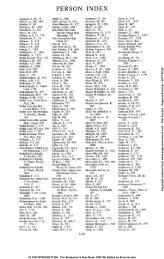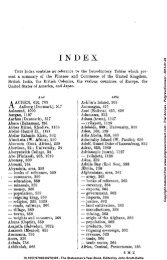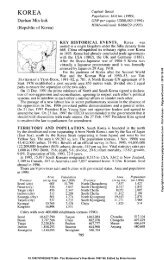Bulgaria - Palgrave Connect
Bulgaria - Palgrave Connect
Bulgaria - Palgrave Connect
Create successful ePaper yourself
Turn your PDF publications into a flip-book with our unique Google optimized e-Paper software.
1136 TURKEY AND TRIBUTARY STATES<br />
recoils!ruelion, ;it. the Sultan's private expense, but flic work is itoi yet<br />
complete. The Assar-i-Tcwjik is to be reconstructed in Germany. The<br />
contract for building a cruiser in America is said to be signed, but delays arc<br />
probable.<br />
For the navy of Turkey the crews are raised in the same manner as tinland<br />
forces, partly by conscription, and partly by voluntary enlistment. The<br />
time of service in the navy is twelve years, five in active service, three in the<br />
reserve, and four in the Redif. The nominal strength of the navy is 6 viceadmirals,<br />
11 rear-admirals, 208 captains, 289 commanders, 228 lieutenants,<br />
187 ensigns, and 30,000 sailors, besides about 9,000 marines.<br />
Production and Industry.<br />
Land in Turkey is held under four different forms of tenure—namely,<br />
1st, as 'Mlri,' or Crown lands; 2nd, as 'Vaeouf,' or pious foundations;<br />
3rd, as 'Mulikaneh,' or Crown grants; and 4th, as 'Miilk,' or freehold<br />
property. The first description, the ' miri,' or Crown lands, which form the<br />
largest portion of the territory of tho Sultan, are held direct from the Crown.<br />
The Government grants the right to cultivate an unoccupied tract on the<br />
payment of certain fees, but continues to exercise the rights of seigniory over<br />
the land in question, as is implied in the condition that if the owner<br />
neglects to cultivate it for a period of three years it is forfeited to the Crown.<br />
The second form of tenure, the 'vaeouf,' was instituted originally to provide<br />
for the religion of the State and the education of the people, by the erection<br />
of mosques and schools ; but this object has been set aside, or neglected, for<br />
several generations, and the 'vaeouf lands have mostly been seized by<br />
Government officials. The third class of landed property, the ' mulikaneh,'<br />
was granted to the spahis, the old feudal troops, in recompense for the<br />
military service required of them, and is hereditary, and exempt from tithes.<br />
The fourth form of tenure, the 'miilk,' or freehold property, does not exist<br />
to a great extent. Some house property in the towns, and of the land in the<br />
neighbourhood of villages, is 'miilk,' which the peasants purchase from tima<br />
to time from the Government.<br />
Only a small proportion of arable land is under cultivation, owing principally<br />
to the want of roads and means of conveyance, which preclude the<br />
possibility of remunerative exportation.<br />
The system of levying a tithe on all produce leaves no inducement to the<br />
farmer to grow more than is required for his own use, or in his immediate<br />
proximity. The agricultural development of the country is further crippled<br />
by custom dues for the exportation of produce from one province to another.<br />
The system of agriculture is most primitive. The soil for the most part is<br />
very fertile ; the principal products are tobacco, cereals of all kinds, cotton, figs,<br />
nuts, almonds, grapes, olives, all varieties of fruits. Coffee, madder, opium,<br />
gums are largely exported. The opium production in 1900 amounted to<br />
about 7,500 chests, or 105,800 lbs. It is estimated that 44 million acres of<br />
the Empire in Europe and Asia are under cultivation. The forest laws of<br />
the empire are based on those of France, but restrictive regulations are<br />
not enforced, and the country is being rapidly deprived ol its timber.<br />
About 21 million acres are under forest, of which 3J million acres are<br />
in European Turkey. Turkey is a wine-growing country, the total production<br />
being estimated at about a million hectolitres annually. Of this amount<br />
about 160,000 hectolitres are exported—chiefly for mixing. The culture of<br />
10.1057/9780230270305 - The Statesman's Year-Book, Edited by John Scott-Keltie<br />
Copyright material from www.palgraveconnect.com - Trial Access - <strong>Palgrave</strong><strong>Connect</strong> - 2012-11-24


